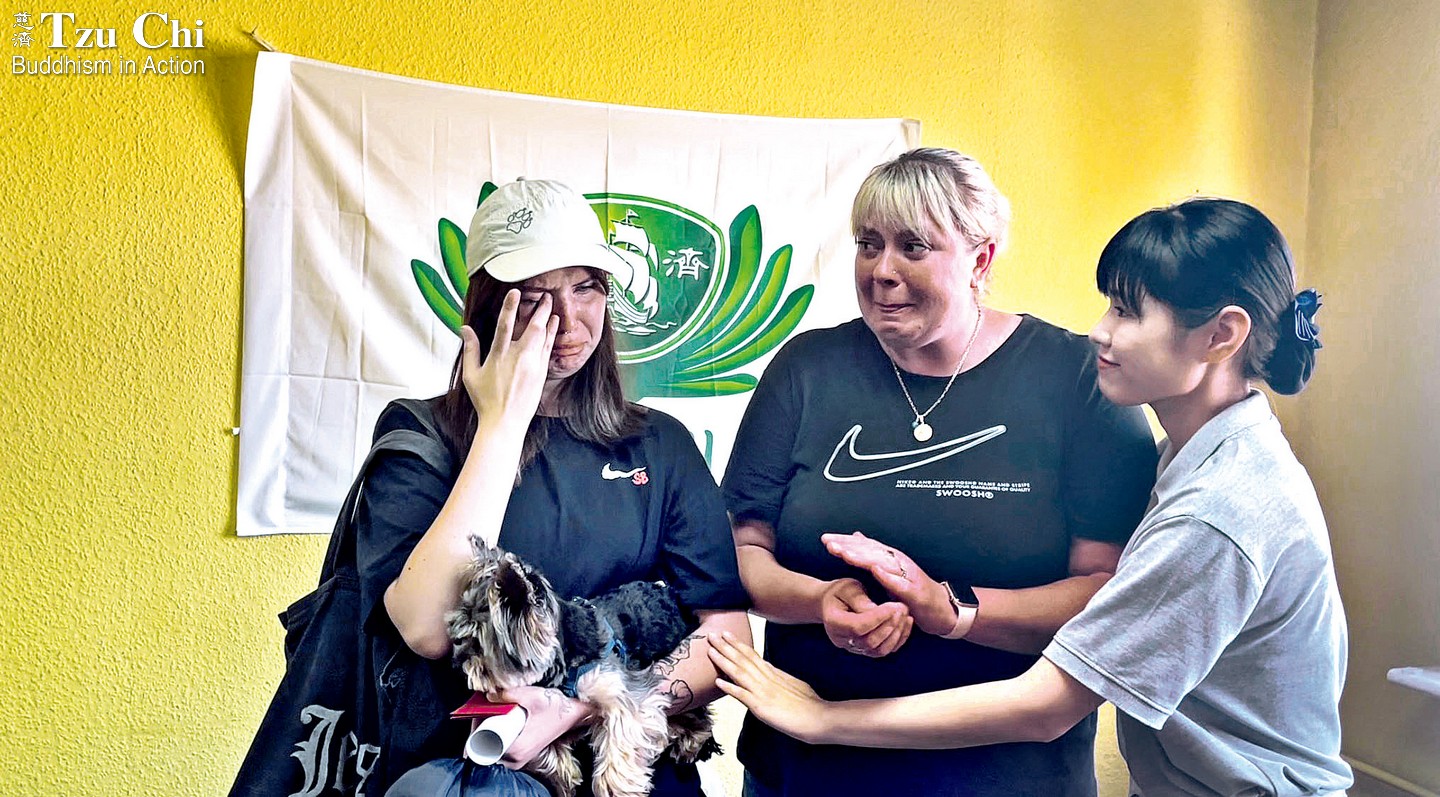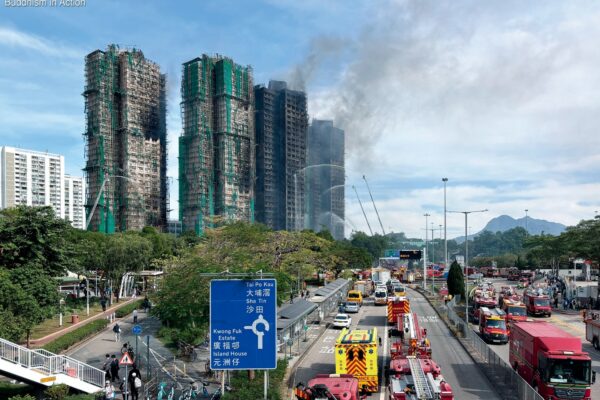By Chen Yi-wei
Translated by Wu Hsiao-ting
I knew they would return to a life of harsh reality after they left the distribution venue. I gave each of them a tight hug, hoping to bring them at least a moment of peace.

Chen Yi-wei (陳翊暐), right, the author of this article, interacts with two Ukrainian refugees who broke into tears after hearing the Ukrainian version of the Tzu Chi song “One Family,” which made them think of their family members still in Ukraine.Courtesy of Chen Yi-wei
Facing the Ukrainian refugees, I couldn’t tell them everything would become better. They had been deprived of the basic rights of a human being: having their own homes, eating well, and sleeping well. Fleeing their homes panic-stricken and empty-handed to take shelter in a foreign land, lining up under the hot sun to receive relief supplies, wearing donated clothes that didn’t fit them…. I asked myself, if I had been in their shoes, could I have faced and survived such challenges?
For these reasons, I wanted to give all my love and warmth to them. I hoped to make every child laugh and be a haven to them, albeit just a temporary one. The time we had together was short—just 20 minutes. After they walked out of this room, the reality facing them would still be harsh; they’d still have to live with the cruel fact that a war had turned their lives upside down. When they were leaving, I gave each of them a tight hug. Even though tears were rolling down their cheeks, I didn’t understand what they were saying to me. All I could do was hug them tighter.
In Szczecin, Poland, Tzu Chi worked with the Oktan-Us Foundation to distribute food and other daily necessities to Ukrainian refugees. The venue, provided by Oktan-Us, was only large enough to accommodate 25 people at a time, so we could serve only 350 to 450 people a day. The venue was some distance from the city center, but the refugees usually arrived before eight in the morning. Then they waited in groups in the shade for their turn to enter the venue. Among them were older people and children. With the sun beating down on them, they were hungry and thirsty. We served food and tea to them. The tea was hot, but they were so thirsty they didn’t mind and quickly drank it without waiting for it to cool off.
The food we brought out went quickly. In fact, we began setting aside some food first and then quietly bringing it to some older people sitting in a corner. We were worried that they didn’t have the strength or the speed to get the food themselves.
It seemed that no matter how much food we prepared, it wasn’t enough to meet the need. A volunteer took out her ATM card, gave it to our partners, and asked them to use the money on the card to buy more food. We couldn’t bear to see the looks of disappointment on people’s faces when they saw the last biscuit taken before they even had a chance to get one. We eventually decided to skip our lunch so that our food could be given to the refugees.
Children politely thanked us when they received food from us. Just a few months ago, they were living a well-provided-for life, with an endless supply of biscuits and drinks waiting for them to consume. But now things were so different. Even so, they were quick to express gratitude for the help people gave them. Looking at the displaced Ukrainians at our distributions, I imagined the pain they must be going through. I imagined how they were feeling after witnessing a war break out in front of them and losing almost everything overnight. How were their relatives, friends, and neighbors? Had they all made it out safely?
When we were being introduced to the refugees during each distribution, they looked at us cheerfully, nodded their heads, or waved to us—though we spoke different languages, they tried to convey their thanks to us in whatever way they could. When we were singing the Tzu Chi song “One Family,” we’d hold the refugees’ hands and form a circle. During those moments, we felt so close to each other, as if we were really family. An older woman left a deep impression on me. She hugged me tightly, and, with tears coursing down her face, said that she felt like a well-respected guest at our distribution.
I had participated in Tzu Chi’s distributions at refugee camps in Serbia. I had also met economic refugees in England, where I live. What marked the Ukrainian refugees as different was that they didn’t look upon themselves as refugees; they didn’t just wait around to receive our aid at a distribution. Whenever they saw a truck arrive that was carrying goods for distribution, they’d form a chain to relay the goods to where they would be placed temporarily. When they saw volunteers moving tables to set up the venue, they pitched in to help too. They used their action to pay us back for our help. In addition, they didn’t just leave after they received our aid. They stayed to interact with us, and to play with children on-site. They tried their best to remain upbeat. They often said they were so grateful to the Polish people who had put them up, and they thanked us for coming from places as far as Taiwan to help them.
Though Tzu Chi’s distributions in Szczecin have come to an end, I try my best to remember every Ukrainian I met. I have saved a place in my heart for them. Since I returned to England from Poland, every time I talk to others about what the refugees have had to go through because of the war, I choke up with emotion. Whenever I shop in a supermarket, I think of them too. I think to myself: “Why is it that I can live such a good life, but they can’t? What else can I do for them?”
That’s why I decided to share with everyone around me the photos and videos I took while I was in Poland participating in Tzu Chi’s work for displaced Ukrainians, so that more people would pay attention to Ukraine, so that more people would know that in Szczecin there too lived a group of Ukrainian refugees, a group uncertain about their future. It’s my way of continuing the affinities I formed with the refugees I met. It’s just like the lyrics from “One Family” say: “Let’s share each other’s lives and burdens.”



